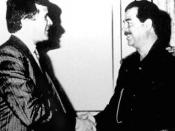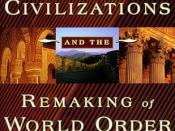Samuel P. Huntington's paper "The clash of civilizations" defines the shifting of causes for friction between nations. He describes the changing of the guard, between secular ideological friction, such as democracy versus communism, to cultural and religious reasoning. Huntington's hypothesis is based heavily on examples of recent struggles between civilizations all over the world. I agree with Huntington's hypothesis because it is evident that since the fall of the "Iron curtain" culture and religion have replaced ideas as the fundamental instigators of conflict. This is also evident citing specific examples from the middle-east, the surrounding areas and from citing examples of conflict between the western world and various other regions around the world.
"The Velvet Curtain of culture has replaced the Iron Curtain of ideology as the most significant dividing line in Europe". It is obvious that since the fall of the soviet union there has been a shift away from ideological conflict, mostly because most nations are democratic, and a shift toward cultural and religious conflict.
Since the end of world war 2 and up until 1989 with the fall of the Berlin wall, the world has been divided along the ideological line of democracy versus communism. It's simple, either you allied yourself with the east which made you a communist sympathizer, or you allied yourself the west. Many struggles and wars were fought along this political divide, an example of this would the Vietnam war. The two super powers used this country as a macro-chessboard. Either side had absolutely no reason to be there, however since one was, then the other had to be. What would happen is that the struggle between the Soviets and the Americans would a cause a civil war. The sparking of this war was when the Vietcong, a socialist...


